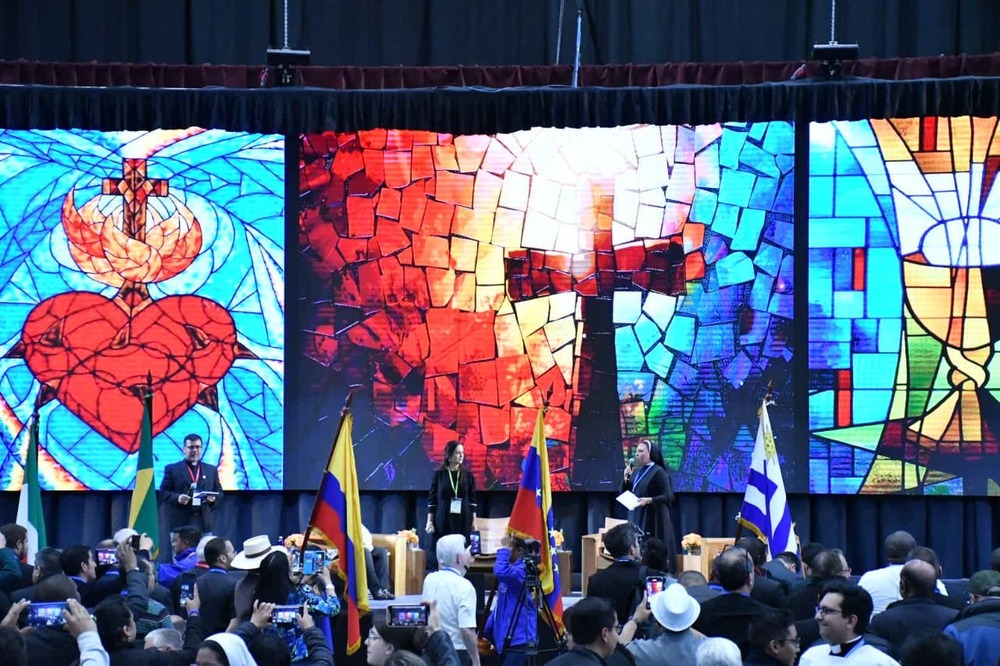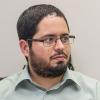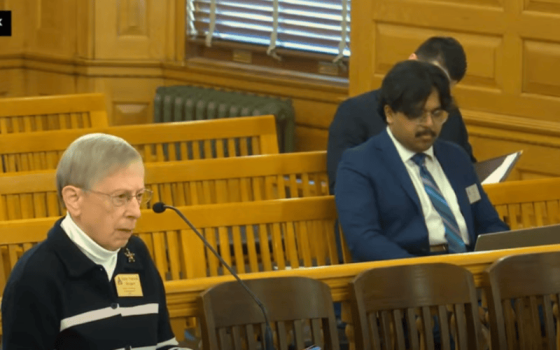
Panelists speak Sept. 10, 2024, during the International Eucharistic Congress in Quito, Ecuador. The Sept. 8-15 congress focused on a call to build fraternity as a way of healing the wounds of a world full of fractures and violence. (OSV News/courtesy International Eucharistic Congress)
The first two days of presentations of the 53rd International Eucharistic Congress in Quito, Ecuador, contrasted the hardships currently faced by many people in different parts of the world with the prophetic responses that the church can provide in times of crisis.
Speakers at the Sept. 8-15 event, coming from various nations, shared their views on the tough realities for millions of people nowadays, from the innocent victims of the war in Ukraine to the immigrant families who take treacherous journeys from South America to the United States and end up finding more exclusion and violence.
In his presentation, Rodrigo Guerra, lay secretary of the Pontifical Commission for Latin America, summarized most of the current "wounds of the world," as the organizers of the congress have been calling the social problems that can be healed by the sense of fraternity provided by the Eucharist.
He mentioned social inequality and the widening gap between the rich and the poor, something that rings an especially alarming bell in Latin America; the lack of care for the Earth, with all the ecological consequences; and the nonexistence of fraternity and forgiveness when it comes to political disagreements.
"Many of our countries are torn apart by tremendous polarizations due to serious ideological opposition," Guerra told the audience, adding that populism — both on the right and on the left — is the undesirable result of those social rifts.
He also named mass immigration — and the absence of an adequate reception by the countries of destination — as one of the most complex challenges of the current time.
Leyden Rovelo-Krull, who heads the Office of Hispanic Ministry of the Diocese of Kansas City-St. Joseph, Missouri, shared her experience working with immigrants who have just been released by the U.S. Immigration and Customs Enforcement after a long trip from South or Central America to the U.S.-Mexico border.
She recalled that in 1983 the U.S. Conference of Catholic Bishops affirmed that the Hispanic and Latino presence in the U.S. eccesial life was "God's blessing for the church and for our country," given that those immigrants had been revitalizing parishes all over the nation.
Despite that, a high proportion of U.S. citizens have been expressing their opposition to the arrival of Latin American immigrants, including Catholic churchgoers.
Rovelo-Krull described the sufferings of some of the people she has met during her work, like a mother who lost her 5-year-old daughter as she was crossing Central America and had to bury her on the way — at a point she doesn't know exactly where it is.
The trauma of so many immigrant families may be comparable to those of the victims of the Russian invasion to Ukraine, vividly described by Auxiliary Bishop Hryhoriy Komar of the Catholic Eparchy of Sambir-Drohobych, a city near the border with Poland. He told the audience that at least 20,000 Ukrainian children have been kidnapped by Russian occupiers.
Advertisement
"Now there are 6 million Ukrainian refugees in the world, and 10 million inside the country. Many towns and cities have disappeared, burying the people below the ruins," he said.
The Russians have occupied a large portion of the country, so it's not possible to know how many Ukrainians were killed, Komar added.
For many participants, those descriptions led to reflections on their own realities. That was the case for Bishop Geovanni Paz of Latacunga, Ecuador.
"Some of those themes impact me very much, like the challenges of immigration, which are also noticeable in my diocese," he told OSV News.
Paz affirmed that every now and then, buses taking dozens of people to the north leave with people from the small Andean communities in his diocese who are seeking a better life.
"We used to receive groups of 1,200 children for catechesis, and now there are only 400," he said, adding that many children are left behind by their parents to live with their grandparents, and they end up leaving school and getting involved with drugs and crime.
"Some of those people are deported back to Ecuador as soon as they reach the U.S. They tell us about the human rights violations they suffer on the way," Paz lamented.
While Pope Francis defends the rights of immigrants, most societies have been rejecting them, the bishop said.
"We have to be a prophetic church. Otherwise, we'll be condoning those stances," he argued.
Presentations about strong prophetic voices came on the following day. On Sept. 10, Latin American bishops talked about some of the most revered figures in the history of the Catholic church in the region.
That is the case of Ecuadorian-born Bishop Leônidas Proaño (1910-1988), who dedicated his life to Indigenous people and peasants, and St. Oscar Romero (1917-1980), the Salvadoran archbishop who was killed by the military regime.
Father Juan Carlos Garzón, secretary-general of the IEC, said that "in the hardest moments God sends to us the prophets of our times."
"We wanted to discover the wounds of the world and then see how Christ comes to redeem us," Garzón explained.






